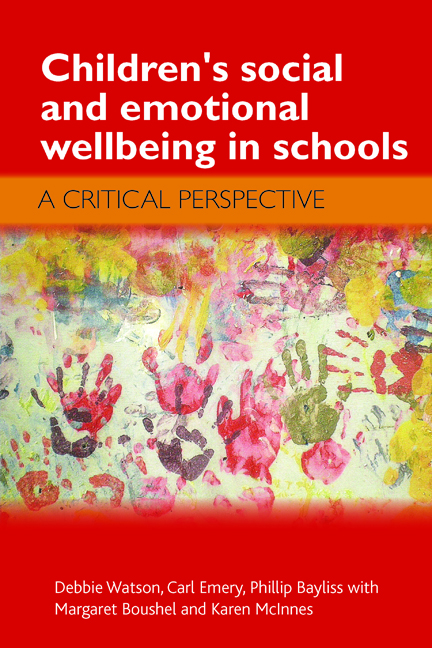Chapter 14 - Conclusion
Published online by Cambridge University Press: 01 September 2022
Summary
Chapter 1 posed a number of questions regarding wellbeing as a concept and its intersections and surrounding fields and concepts, which were proposed in Figure 1.1. We asked to what extent the concept of social and emotional wellbeing (SEWB), as operationalised for children in schools, was consistent and the extent to which we could observe the practice and effects of the concept. Lastly, we asked whether in deconstructing wellbeing, we were either rearranging the plane, articulating a new plane or forcing an intersection of that plane with others.
The book has addressed these questions and raised new ones about the concept and practice of wellbeing in schools, and with children. We have revealed the inconsistencies inherent in the concept and explored ways in which wellbeing is operationalised in schools and the role of educational professionals and educational discourses in perpetuating a belief in the need to make all of our children ‘well’ with universal agendas, policies and programmes. In deconstructing and tracing the genealogy of wellbeing, we are rearranging the ‘plane of immanence’ (Deleuze and Guattari, 2009). In interrogating concepts of education, welfare, law, childhood, philosophy, politics, health, psychology, anthropology and cultural studies (as they intersect and relate to the concept of wellbeing; see Figure 1.1) we have foregrounded and examined these complementary concepts in ways that allow new light to be shed on wellbeing:
Philosophical concepts are fragmentary wholes that are not aligned with one another so that they fit together, because their edges don't match up. They are not pieces of a jigsaw puzzle but rather the outcome of throws of the dice. They resonate nonetheless, and the philosophy that creates them always introduces a powerful Whole that, while remaining open is not fragmented: an unlimited One-All, an ‘Omnitudo’ that includes all the concepts on one and the same plane. It is a table, a plateau, or a slice; it is a plane of consistency, or more accurately, the plane of immanence of concepts, the planomenon. (Deleuze and Guattari, 2009, p 35)
Many theories of wellbeing acknowledge the deeply embedded nature of the concept, but they also try to ‘fit’ the pieces of the jigsaw together, see associations and build theoretical models that enable predictions and hypotheses about wellbeing to be posited.
- Type
- Chapter
- Information
- Children's Social and Emotional Wellbeing in SchoolsA Critical Perspective, pp. 221 - 228Publisher: Bristol University PressPrint publication year: 2012



